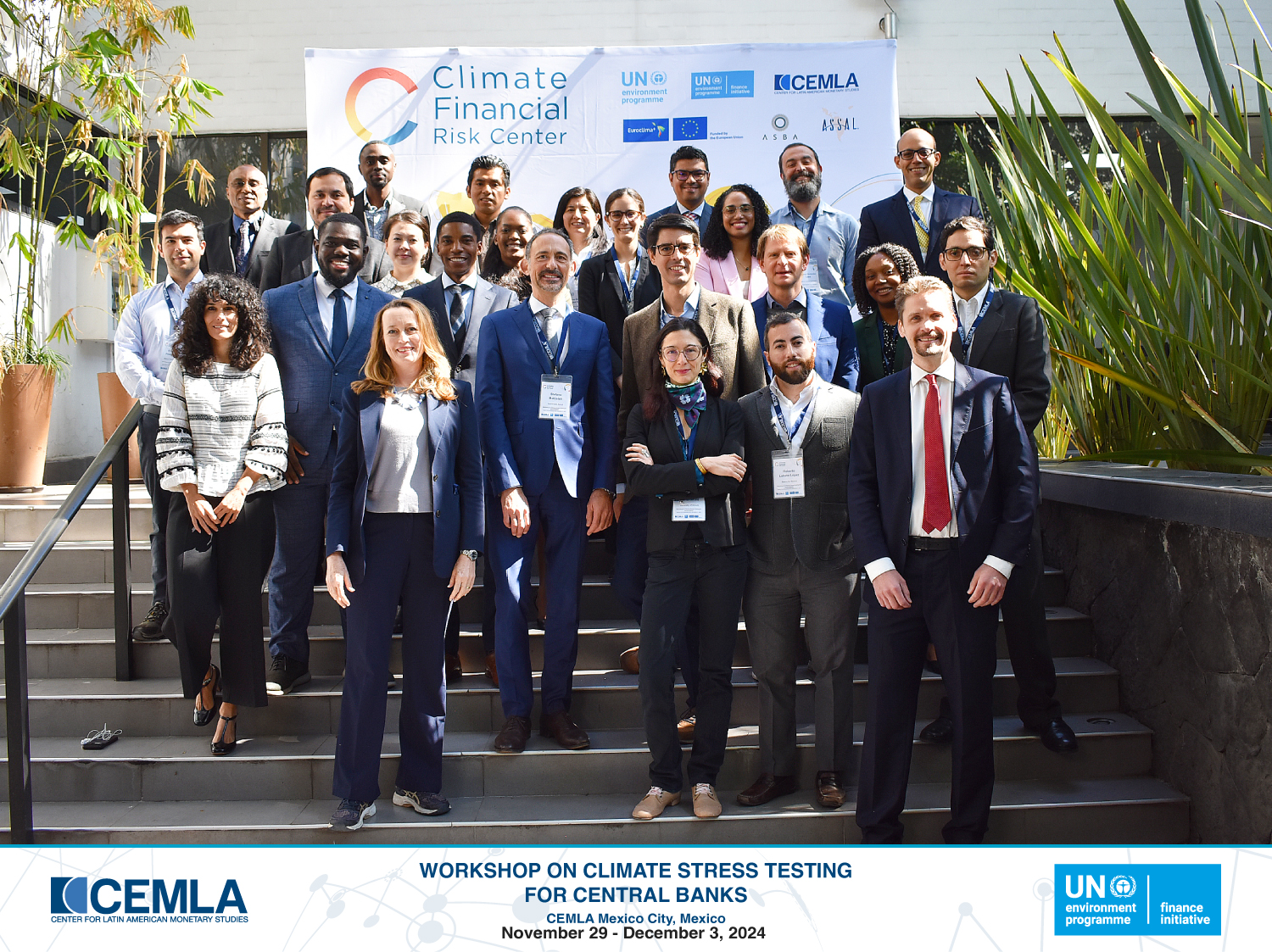

Disponible en
Español
![]()
Workshop on Climate Stress Testing for Central Banks
CEMLA Mexico City, Mexico
November 29 - December 3, 2024
The Workshop on Climate Stress Testing for Central Banks was jointly organized by the CEMLA, the United Nations Environment Programme Finance Initiative (UNEP FI), and Euroclima+. Held at CEMLA's premises in Mexico City, Mexico, from November 29 to December 3, 2024, the event brought together 25 representatives from 14 institutions, including CEMLA Members and other organizations.
The workshop was delivered by the world-renowned scholars Prof. Irene Monasterolo (Utrecht University) and Prof. Stefano Battiston (University of Zurich and University of Venice) and aimed to enhance central banks’ methodological capacities for assessing climate-related financial risks, enabling attendees to develop use cases for climate stress testing applications that central banks can incorporate as an analytical tool for financial stability monitoring.
The workshop focused on forward-looking climate risk assessments under different scenarios for physical and transition risks and included sessions on the macrofinancial criticality of climate risks, climate risk assessment in the economy and finance, and climate stress tests for physical and transition risks.
Irene Monasterolo
Irene Monasterolo is a Full Professor of Climate Finance at Utrecht University's School of Economics, specializing in the effects of climate risks on fiscal and financial stability, as well as the financial system's role in climate mitigation and adaptation. She co-developed the first climate stress test for the financial system, which connects climate scenarios with financial valuation and risk metrics, including network effects. Prof. Irene also co-developed the EIRIN Stock-Flow Consistent macro-financial model to study the impacts of climate risks and green policies in the transition to a low-carbon economy. Her work has been published in prominent journals such as Science and Nature Climate Change.
Prof. Irene has collaborated with major financial institutions, including the World Bank, European Central Bank, European Stability Mechanism, and the Monetary Authority of Singapore, on climate risk assessments. Currently, she works with the Network for Greening the Financial System (NGFS) on short-term climate scenarios and with the European Commission to address the climate insurance protection gap in Europe. She is a visiting professor at WU Wien, associate editor at Ecological Economics, a CEPR research fellow focusing on climate change and finance and affiliated with the Institute Louis Bachelier and SUERF.
Stefano Battiston
Stefano Battiston is an Associate Professor in Sustainable Finance and Networks at the University of Zurich, where he also serves as vice-chair of the Center of Competence for Sustainable Finance. He holds a part-time position as Associate Professor at Ca' Foscari, University of Venice. Prof. Stefano is a Lead Author for the Finance and Investment chapter in the sixth Assessment Report of the Intergovernmental Panel on Climate Change.
A prominent scholar in sustainable finance, Prof. Stefano has significantly advanced the understanding of financial interconnectedness, risk, and stability. He has led impactful research on climate-related financial risk, with methodologies for conducting climate stress tests and quantifying systemic risk in financial networks widely adopted by finance practitioners and supervisors.
With over 50 publications in top journals such as Science, PNAS, Management Science, Nature Communications, and Nature Climate Change, he combines a scientific background in complex systems with 15 years of policy-relevant research in economics and finance. This allows him to approach societal questions from both a quantitative and holistic viewpoint. Prof. Stefano has coordinated several EU and Swiss projects on finance and sustainability, notably leading the EU Future Emerging Technologies projects SIMPOL and DOLFINS from 2014 to 2018, which aimed to enhance financial stability and channel finance more effectively towards sustainability in a networked economy.

